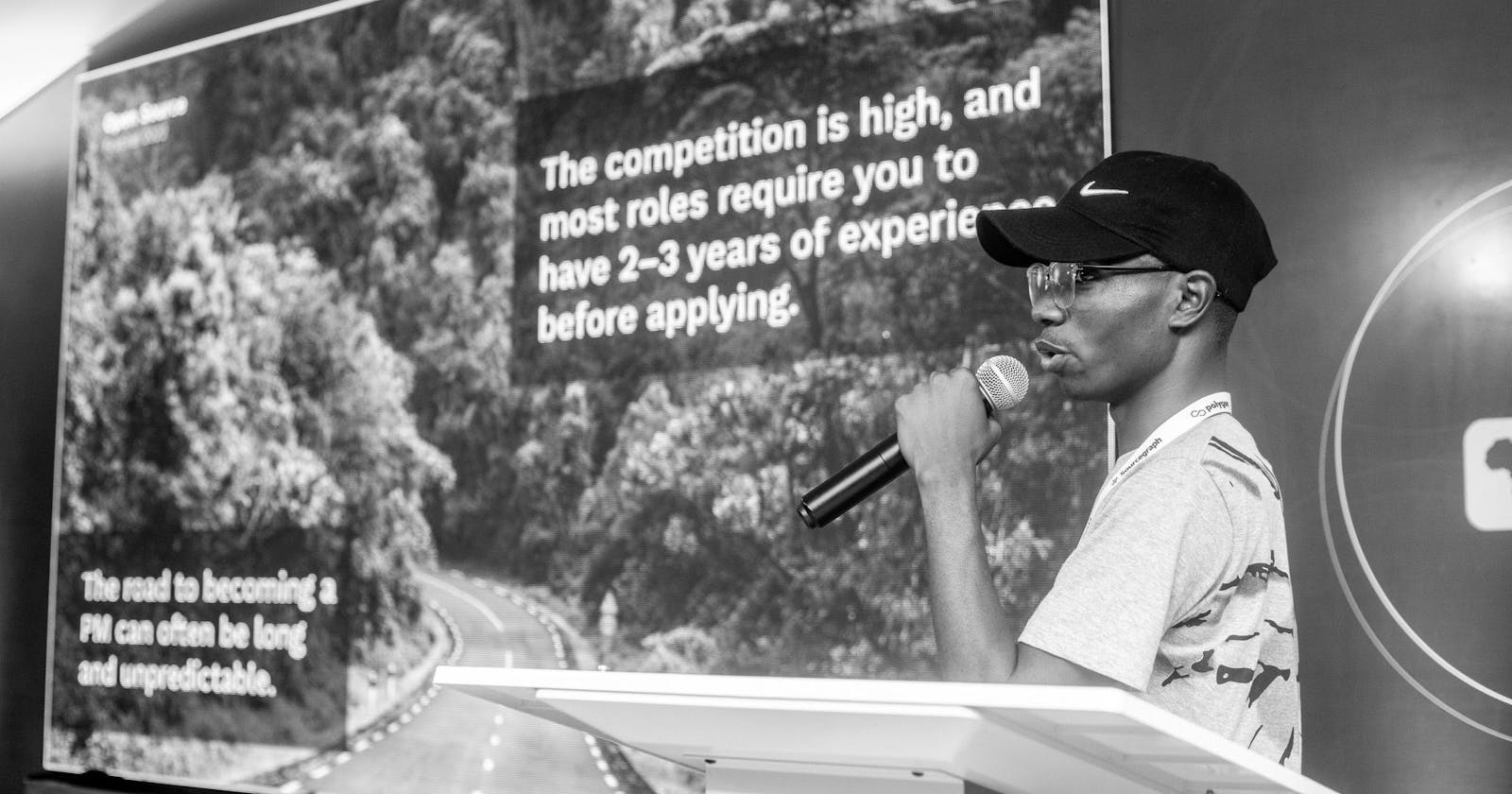Breaking into Product Management with Open Source
I converted my first public talk at OSCAFEST22 by Open Source Community Africa into an article.
It is easy at first thought to look at an author as a highly esteemed expert in a domain. Interestingly, that is not the case with me. As a curious being, exploring lots of fields in the technology industry ranging from visual design to programming, to product management, and then community management, the phrase “open-source” has always rung a bell.
Having drawn some experiences from my contribution to open-source as an entry-level product manager, I am excited to share with the community how first-time product managers can take full advantage of the open-source platform to build a lucrative product management career.
Let’s start!!
What exactly is open source software?
In simple terms, open-source software is software with source code that anyone can inspect, modify, and enhance. Opensource.com has documented a more detailed and comprehensive article to help you understand what open source really is.
You already know what product management is and what a product manager does on a team. I believe you do.
How do many break into product management?
 Photo Credit: Unsplash
Photo Credit: Unsplash
Many argue that breaking into product management is hard, and so requires that you put your boxing gloves on to face it and hit it so hard to break in. Yet many believe it is relatively easier to break into compared to writing and debugging blocks of code (lol) or pushing pixels to design loads of wireframes for a product. What do you think?
Our journeys and approaches can be different, so it is safe to say that the road to becoming a product manager can often be long and unpredictable. Also, with the increasing level of competition in the job market, getting a role as an entry-level product manager can be difficult. And then you’re required by recruiters to have 2-3 years of experience to be employed to join a product team. Then you ask, how am I expected to get the experience?
Many interested folks try to break into product management in several ways. A quick look at the four widely known ways:
(i) Internal transition at a large organization which might require your manager to advocate for you as a good fit to transition within the company, an internal transition process, and you obviously must have proof that you have some of the transferable skills. This is generally considered the quickest route to product management experience.
(ii) Junior PM roles at large organizations. This is quite common also, though an organization needs to have an internship or associate product management program to be able to employ a junior product manager.
(iii) Some also try to break into product management by joining startups.
(iv) Starting a side project seems like another awesome way to break into product management.
Now it is obvious that without hands-on experience on the job, it would be difficult to become a product manager. However, as stated by David Ryan, an open-source product manager: “Few people are taking advantage of what is possibly the most under-utilized path to practical product management experience.”
What is this path? OPEN-SOURCE.
It is good to note that for an open-source project to be successful, a lot is needed beyond code. This could range from the strategy for the project, user research, and linking the strategy to work that needs to be done daily. These are all activities that a product manager should be actively involved in. But how much of the product management discipline is the responsibility of a first-time product manager?
Susana Videira Lopes in one of her articles stated; “The essence of getting an entry-level product role is to introduce you to the product management discipline in a way that builds up your confidence, while at the same time delivering value for the organization as early as possible.”
How can an entry-level product manager get involved in all activities of a product manager in an open-source project and deliver value?
Simple answer: Ask Questions.
Ask questions like these:
What problem or opportunity is being explored?
How is the solution being framed to tackle this problem?
What is being measured to determine if this is successful?
Who are the people that this solution serves?
How are they being informed about it?
How does the solution fit with both the immediate and wider ecosystem? Where is the documentation being maintained on the project?
Do we understand accessibility requirements? Are we meeting them?
When you express your courses' acquired skills as thoughtful questions, the team can further consider them and select the ones that resonate the most with the team or community, then they are made priorities and explored. These questions can be further profiled in any of the relevant product management tools such as “user personas”, “customer journey map”, “lean canvas” and more.
This definitely, is believed to be the kind of experience and portfolio building that would go a long way to developing career potential.
My Experience at OpenUnited
It makes sense at this point to talk about my short experience contributing to the open product, OpenUnited. What is OpenUnited? OpenUnited is a platform that connects digital talent and work in a unique way. Specific skills are proven on high-quality open products, and once work is verified, these talented contributors are eligible to work for companies on paid tasks.
OpenUnited as an open-source platform, onboards contributors of all kinds - product managers, developers, designers, business analysts, and others, help them improve and prove their skills, and provide them with a long-term source of high-quality paying work.
A senior product manager at Miro, Farbod Saraf, onboarded me on this platform which he had created with a partner. I joined, learned about how contributing to OpenUnited and subsequently, other projects can help me grow in my product management career and proceeded to make my first contribution. It was a good experience because I got to start working quickly on bits of the product, to improve the experience of other users of the platform. My mentor Farbod made it quite easier by making himself available to provide any needed help while I contributed to the project.
I would recommend the OpenUnited platform to anyone who would love to break into product management with open source.
How Do you find Open Source Projects?
Many have been made to believe that contributing to open-source is best left to developers because they find it difficult to search and get open-source projects they can comfortably contribute to.
There are several ways to easily find open-source projects to contribute to as a first-time product manager. Here’s a list of some;
Speak up at product manager communities that you are already part of such as Mind The Product, Product School, etc. Closed mouths never get fed.
Another fine way is reaching out to product managers working at larger open source companies such as GitLab, Mozilla, Elastic, etc. They could refer you to open-source projects where your skills and contribution could be beneficial.
Open-source advocates and DevRel teams at open source companies also have great recommendations of open projects that an entry-level product manager can contribute to.
Open-source companies on AngelList or popular open-source products on Product Hunt are great places to consider in your search for open products to contribute to.
Local meetups and open source conferences are great places to connect with open source project creators and maintainers. Open Source Community Africa Festival is one such great conference.
Now, what next?
My favorite Github star, Ruth Ikegah, a great source of inspiration, wrote an article for beginners in open source. In her article, she stated some tips to consider as you embark on contributing to open-source.
Before joining and contributing, do some research on the project, community, or organization, and ask questions where not clear.
When you finally decide to join the community, try to be active by introducing yourself and stating areas where you can help the project.
The future is open! So everything you contribute to an open-source project becomes a powerful public record of your development as a product manager.

